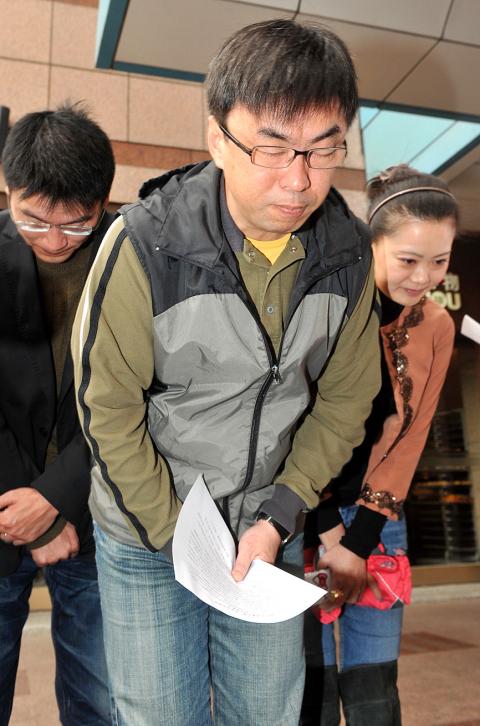Under a call for unity, former Democratic Progressive Party (DPP) legislator Tuan Yi-kang (段宜康), who had previously declared his intention to run in the legislative election, announced yesterday that he would not join the party primary.
Before the announcement, the field for Taipei City’s second district, which is comprised of Shilin (士林) and Datong (大同), was crowded with four hopefuls vying for the party’s nominations — namely Tuan, former legislators Luo Wen-chia (羅文嘉) and Julian Kuo (郭正亮) and former Government Information Office minister Pasuya Yao (姚文智).
UNITED FRONT

Photo: Chien Jung-fong, Taipei Times
In a bid to consolidate and form a united front, the DPP Legislatorial District Nomination Committee invited the four candidates to negotiate a solution.
While Kuo did not show up, Tuan said he would back out of the primary and the committee had accepted his decision.
Following his announcement, Tuan, accompanied by DPP Taipei City councilors Wu Su-yao (吳思瑤), Hsu Shu-hua (許淑華) and Liang Wen-chieh (梁文傑), apologized to all his supporters.
“I have felt the expectations of the voters, but I hope the DPP spirit of ‘giving for the sake of unity’ is preserved,” Tuan said, adding that he made his decision because he did not want to see the voters torn by difficult choices in the primary.
STICK TOGETHER
Tuan said he believes the remaining three candidates for the Shihlin-Datong constituency would abide by the outcome of the party primary and win the elections “by sticking together.”
Tuan added he would not consider running in another constituency.
When asked for response to Tuan’s decision to back out, Yao said he had no comment, while Luo said he would work harder. Kuo said it was Tuan’s personal judgement of the situation.

Alain Robert, known as the "French Spider-Man," praised Alex Honnold as exceptionally well-prepared after the US climber completed a free solo ascent of Taipei 101 yesterday. Robert said Honnold's ascent of the 508m-tall skyscraper in just more than one-and-a-half hours without using safety ropes or equipment was a remarkable achievement. "This is my life," he said in an interview conducted in French, adding that he liked the feeling of being "on the edge of danger." The 63-year-old Frenchman climbed Taipei 101 using ropes in December 2004, taking about four hours to reach the top. On a one-to-10 scale of difficulty, Robert said Taipei 101

Nipah virus infection is to be officially listed as a category 5 notifiable infectious disease in Taiwan in March, while clinical treatment guidelines are being formulated, the Centers for Disease Control (CDC) said yesterday. With Nipah infections being reported in other countries and considering its relatively high fatality rate, the centers on Jan. 16 announced that it would be listed as a notifiable infectious disease to bolster the nation’s systematic early warning system and increase public awareness, the CDC said. Bangladesh reported four fatal cases last year in separate districts, with three linked to raw date palm sap consumption, CDC Epidemic Intelligence

US climber Alex Honnold left Taiwan this morning a day after completing a free-solo ascent of Taipei 101, a feat that drew cheers from onlookers and gained widespread international attention. Honnold yesterday scaled the 101-story skyscraper without a rope or safety harness. The climb — the highest urban free-solo ascent ever attempted — took just more than 90 minutes and was streamed live on Netflix. It was covered by major international news outlets including CNN, the New York Times, the Guardian and the Wall Street Journal. As Honnold prepared to leave Taiwan today, he attracted a crowd when he and his wife, Sanni,

Taiwanese and US defense groups are collaborating to introduce deployable, semi-autonomous manufacturing systems for drones and components in a boost to the nation’s supply chain resilience. Taiwan’s G-Tech Optroelectronics Corp subsidiary GTOC and the US’ Aerkomm Inc on Friday announced an agreement with fellow US-based Firestorm Lab to adopt the latter’s xCell, a technology featuring 3D printers fitted in 6.1m container units. The systems enable aerial platforms and parts to be produced in high volumes from dispersed nodes capable of rapid redeployment, to minimize the risk of enemy strikes and to meet field requirements, they said. Firestorm chief technology officer Ian Muceus said